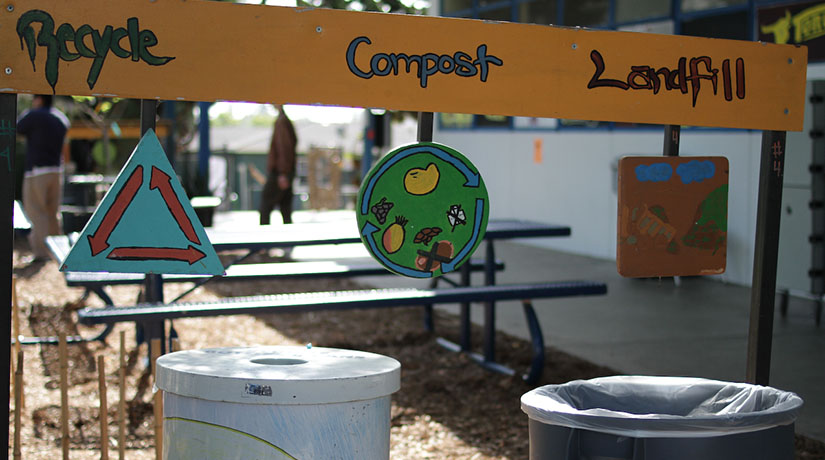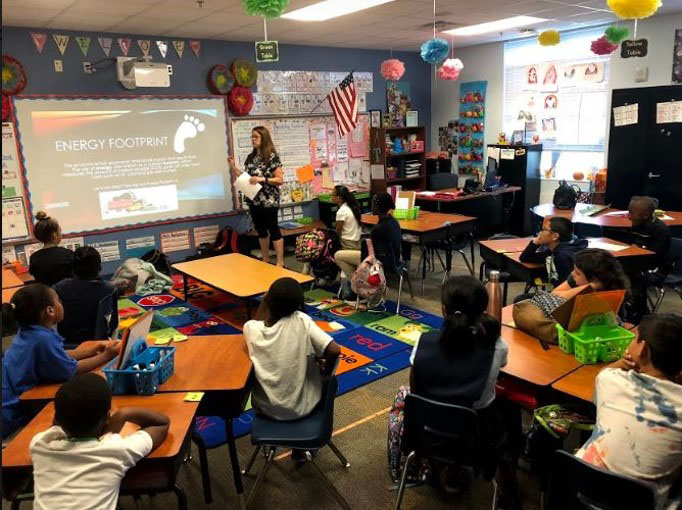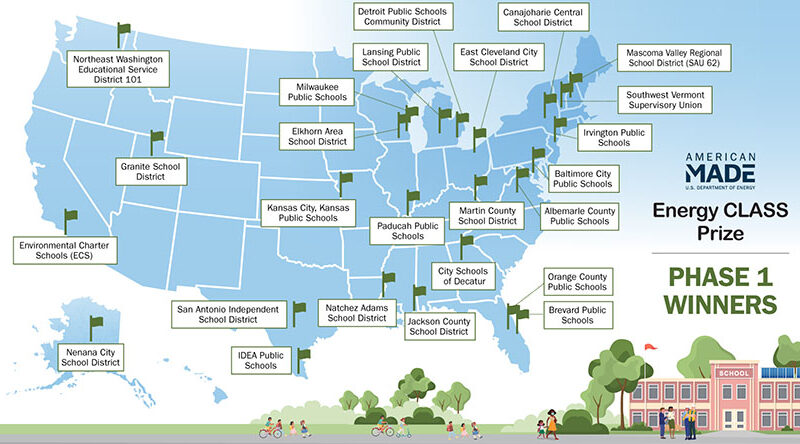Energy Class Prize Winners
Every day, students around the country attend school in buildings that are outdated—sometimes more than a century old. Without sufficient budget for infrastructure upgrades, those aging buildings might have leaky roofs, moldy ceilings, or a lack of air conditioning—all of which make for less-than-optimal learning environments. Energy Class Prize Winners
The Energy CLASS (Champions Leading the Advancement of Sustainable Schools) Prize was designed to give underserved communities a leg up when it comes to making those needed upgrades in their schools. Now, 25 local education agencies (LEAs) have been named Energy CLASS prize winners and awarded $100,000 each, along with the training and one-on-one coaching needed to put those funds to work helping their schools meet health and energy-efficiency goals.
The prize was created to complement the Renew America’s Schools Grant, launched by the Office of State and Community Energy Programs within the U.S. Department of Energy (DOE). As part of the American-Made program, the Energy CLASS Prize is administered by the National Renewable Energy Laboratory.
Meet the Winners
Many of the LEAs who won Phase 1 of the prize represent traditionally underfunded and/or understaffed schools from across the country. Among the winners is a tiny school district in Alaska; a not-quite-big-enough-to-get-special-funding district in Wisconsin; and the ninth-largest district in the country, with the potential to impact more than 200 schools, in Orlando, Florida.

“The winning LEAs represent every sector of the school system, from rural to urban,” said Robin Tuttle, Energy CLASS Prize technical lead and a project manager in NREL’s Buildings and Thermal Sciences Center. “It was clear from the start of the prize that there are so many schools struggling to find the time or staffing to make these much-needed changes. It’s wonderful to be able to equip them with both funds and hands-on training that can set them on the path to healthier, more efficient classrooms and school campuses.”
The following is a complete list of Energy CLASS Prize winners:
- Albemarle County Public Schools, Virginia
- Baltimore City Public Schools, Maryland
- Brevard Public Schools, Florida
- Canajoharie Central School District, New York
- City Schools of Decatur, Georgia
- Detroit Public Schools Community District, Michigan
- East Cleveland City School District, Ohio
- Elkhorn Area School District, Wisconsin
- Environmental Charter Schools, California
- Granite School District, Utah
- IDEA Public Schools, Texas
- Irvington Public Schools, New Jersey
- Jackson County School District, Mississippi
- Lansing Public School District, Michigan
- Martin County School District, Kentucky
- Mascoma Valley Regional School District – SAU 62, New Hampshire
- Milwaukee Public Schools, Wisconsin
- Natchez Adams School District, Mississippi
- Nenana City School District, Alaska
- Northeast Washington Educational Service District 101, Washington
- Orange County Public Schools, Florida
- Paducah Public Schools, Kentucky
- San Antonio Independent School District, Texas
- Southwest Vermont Supervisory Union, Vermont
- Unified School District No. 500, Kansas
When Phase 2 kicks off this fall, teams will have the opportunity to join live virtual trainings hosted by prize partners New Buildings Institute and ICF, as well as one-on-one coaching sessions that will cover topics such as building science, benchmarking, indoor air quality, and procurement strategies. Coaches will guide each LEA through the establishment of SMART (Specific, Measurable, Achievable, Relevant, and Time-Bound) goals, in which they will transform their school energy/facility assessments into a building energy management and upgrade plan to meet their goals.
At the end of the second phase, in late spring of 2024, teams will submit information about the progress they have made toward their SMART goals alongside a plan for future building upgrades; teams that demonstrate sufficient progress will receive a $50,000 bonus prize.
A Closer Look at the Communities Who Will Benefit
In Alaska, just an hour west of Fairbanks, the Nenana City School features a boarding facility that houses students who come from rural villages around the state. As a result, the benefits and lessons students will take away from these building upgrades will travel outside of their small town. “The district’s vision is to be the exemplary rural school district in Alaska,” said Stephen Calkin, grants and curriculum director for Nenana City School District. Up until now, he said, the district has been caught in an age-old trap: Without funds to upgrade aging facilities, those facilities cost more and more to operate over time—which, in turn, increases annual operating costs and reduces the chance of ever using general funds to upgrade facilities.
“We cannot get there solely with the current funding provided by the state,” Calkin said. The Energy CLASS Prize winnings, however, will “reduce our operating costs, increase our efficiencies, and [enable us to] perform preventative facility upgrades and maintenance so we can run leaner and put our limited dollars where they most belong: in the classroom.”
Travel east a few thousand miles to Wisconsin, and you will find the Elkhorn Area School District, which has long been searching for the funds (and know-how) to implement energy-efficiency initiatives, but always seems to fall short.

“Larger cities have nonprofits and coalitions dedicated to providing assistance, but that resource just isn’t available to smaller communities like ours,” said Katie James, community grant writer for the district. She added that while there is a lot of information online about how to improve their schools, what they really need is more hands-on guidance. “We’re facing these challenges just like hundreds of other small towns all around the country. This prize and training is truly the lighthouse we needed to feel seen and get help, too.”
In Orlando’s Orange County Public Schools (OCPS), 210 schools are served by three energy advisers.
“This award will allow OCPS to expand our energy conservation efforts, reduce costs, and further provide educational support to our students and staff,” said Jennifer Fowler, director of environmental compliance and sustainability at OCPS.
School Resources
The application period for the Energy CLASS Prize has closed. There are other resources available to schools interested in pursuing energy improvements.
- DOE’s Efficient and Healthy Schools Campaign offers technical assistance and recognition for improving school facilities’ energy efficiency and indoor environmental quality.
- DOE’s Financing Efficient and Healthy Retrofits website features solutions to access capital and financing for energy-efficiency projects in schools.
- DOE’s Better Buildings K–12 Resource Hub features case studies, toolkits, and guidance on improving energy efficiency in schools.
- The Environmental Protection Agency’s Healthy School Environments website presents information on key topics related to establishing and enhancing healthy school environments.
- DOE’s Green Strides School Sustainability Resource Hub is a website for schools to access free resources on healthy, safe, sustainable, 21st century learning environments and environmental sustainability education.
The second round of Renew America’s Schools grant funding spring 2024. Check the website for updates about the next round.
Visit the American-Made program website to learn more about similar competitions designed to accelerate energy efficiency. Follow the Energy CLASS Prize to stay up to date on competitors’ progress!
https://www.techedmagazine.com/category/news-by-industry/energy-education/
Source: Energy Class Prize Winners
https://www.nrel.gov/news/program/2023/energy-class-phase-1-winners.html

